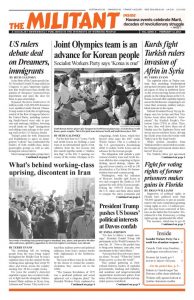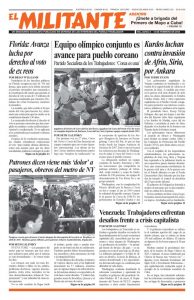VANCOUVER, British Columbia — After spending three years and two months in a French prison without being convicted of any crime, Hassan Diab, 64, a university professor from Ottawa, was released Jan. 12 and returned to Canada. No charges had ever been filed against him though French authorities falsely insisted he had been involved in placing a bomb near a Paris synagogue in 1980 that killed four bystanders. Diab is a Lebanon-born Canadian citizen.
The Canadian government had arrested and expelled him to France based on allegations so flimsy that Robert Maranger, the Ontario Superior Court judge who ordered his extradition, called them “weak, convoluted and confusing.” The case has shone a spotlight on Canada’s reactionary extradition laws and its use of the “war on terror” to attack democratic rights.
Throughout the 10 years since his arrest Diab maintained his innocence, saying he condemned the bombing. He was studying in Beirut at the time and the handwriting and fingerprints of the alleged bomber were not his.
When Diab was released, fellow prisoners chanted, “Hassan est libre. Hassan est libre.” (Hassan is free). “I had to shout to one prisoner from behind a door: ‘Tell them all I am leaving.’ And the whole floor erupted,” he told the press.
Diab’s ordeal began in November 2008 when he was arrested by the Royal Canadian Mounted Police after French authorities accused him of being involved in the synagogue bombing. He was jailed for four and a half months and then placed under house arrest, forced to wear a monitoring device. Maranger ordered his extradition in June 2011.
Diab appealed to Canada’s Supreme Court, but the judges refused to hear his case. He was extradited to France and thrown in a maximum-security prison in Paris in November 2014. He was held in pretrial detention without ever having been charged or brought to trial. For most of the time he was in jail he was in solitary confinement, allowed to leave his cell only one or two hours a day.
Eight times French judges ordered his release. These were all overturned on government appeal. Finally, in January of this year, the court dismissed all charges against him and ordered his release. Even though he is free and back in Canada, the French government and parties representing the victims have filed appeals.
At a press conference in Ottawa Jan. 17, Diab said his “number one mission is to get rid of the extradition law.” He and his supporters are also demanding a public inquiry into how he was treated.
The law is an attack on the rights of all working people. It allows extradition solely on the basis of a foreign government’s request.
Prime Minister Justin Trudeau said he was “noncommittal” when reporters asked if he would do something about the law.
The imprisonment of Diab by French authorities was part of their ongoing attacks on political rights in the name of the so-called war on terror. The extradition was the same thing — the Canadian government aims to increase the ability of the ruling rich to attack the rights of all working people and sow divisions among us.
“What drove me to keep going was my family and my supporters,” Diab told the Ottawa Citizen. “They kept sending me books and signed postcards with messages —‘hang in there, we will not let you down. We will bring you back.’” And they did.
Present at the Ottawa press conference were representatives of the Hassan Diab Support Committee, Amnesty International Canada, the Canadian Association of University Teachers, the International Civil Liberties Monitoring Group and Donald Bayne, Diab’s lawyer.
Roger Clark, a spokesperson for the support committee, told the Militant that groups demanding Diab’s freedom were formed in Ottawa, Toronto, Vancouver and Kingston, Ontario. They continued the fight after he was extradited, raising money and organizing petitions and protests. “The mounting pressure” helped win Diab’s release, Clark said.

